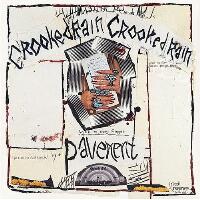Hyper-Creative Idling: Pavement's Crooked Rain Crooked Rain: LA's Desert Origins
reviewed by dave heaton
 "For me, Crooked Rain represented a new Pavement...It made it possible for us to BE a band." - Sprial Stairs in the liner notes to Crooked Rain Crooked Rain: L.A.'s Desert Origins
"For me, Crooked Rain represented a new Pavement...It made it possible for us to BE a band." - Sprial Stairs in the liner notes to Crooked Rain Crooked Rain: L.A.'s Desert Origins
"It's not me saying 'get short hair!' I'm totally into long hair. I'd have it if I could, but it looks bad on me." - Stephen Malkmus in the liner notes to Crooked Rain Crooked Rain: L.A.'s Desert Origins
It might seem like a stereotype but it's also an understatement: on their debut album Slanted and Enchanted, Pavement sounded like the biggest slackers in the world. The key word there is 'sound', as it wasn't just about their wise-ass lyrics, it was how they sounded. In a word, lazy, but that's not an insult. Robert Louis Stevenson gave praise to the idlers, and that's what Pavement sounded like - the musical equivalent (the California equivalent?) of the slackers in Richard Linklater's film of the same name. On their earliest songs, Pavement sound unconcerned with trying to make you like them; they're just doing their thing, making each other laugh.
Their second album Crooked Rain Crooked Rain has the same feeling, but it's like they've come out to play, pushed themselves up on stage instead of just playing in the corner. They're pushing themselves towards people, not waiting for people to come to them. In other words, Crooked Rain Crooked Rain finds Pavement making their sound bigger, brighter, more "accessible" without really changing it that much. It's essentially a more awake version of Slanted and Enchanted, and in Technicolor.
The brighter light made Pavement's melodies more distinct, their rock sensibility more defined, and Stephen Malkmus' wry goofball poetry even wry-er and more goofy. The heartfelt sense of resignation that informed even the most abstract of songs on Slanted was here too, and was just as heartfelt - "Stop Breathing" is the prime example. But the shiny sound highlighted the optimism underneath, too.
Crooked Rain Crooked Rain was the album that made pavement into PAVEMENT, it made them big-time; when Malkmus digged at Smashing Pumpkins in "Range Life" people actually took it seriously (not real people, but MTV News people). And I saw Adam Duritz - an overnight megastar at the time thanks to that song about Mr. Jones - sing a few lines of "Stop Breathing" during a Counting Crows show, even.
Not that Pavement every became real rock stars, that's one of the reasons they remained great. Their next album would be even stranger. Wowee Zowee had a spaciness to it that's hinted at in some of the Crooked Rain b-sides that are stuck after the album proper on Back to the Gold Soundz (Phantom Power Parables), the first disc of the 2-disc extravaganza that is Crooked Rain Crooked Rain: L.A.'s Desert Origins. Those b-sides, though, also allude to the sound of their earlier songs ("Nail Clinic"), remind you how pretty their music can be ("Strings of Nashville"), and highlight an R.E.M. that might seem surprising but really shouldn't be (the tribute song "Unseen Power of the Picket Fence" and a cover of "Camera").
The first disc has 11 b-sides, but the second disc, After the Glow (Where Eagles Dare), is where we take a deeper dive into the untold story of Pavement. Suitable to Pavement, this isn't a story really, and these songs don't exactly pull a new side of Pavement out of the ether, but After the Glow collects 25 previously unreleased recordings, 21 of which come from the sessions for Crooked Rain. Several of these aren't just unreleased recordings but unreleased songs - essentially from this you can piece together a completely unheard Pavement album, with songs that in style fall somewhere betwen Slanted and Crooked, and in substance are quite good. Superfans will love draft versions of album songs with different lyrics ("Range Life" is more haunting here, if rougher; "Stop Breathing" is angrier). Pavement biographers will find extra interest in the fact that the first eight songs come from sessions with the band's first drummer Gary Young, before his departure early on in the recording of Crooked Rain Crooked Rain. The last four songs on the CD come from around the time of the album's release, but they're unique; they're not live versions of album tracks, but particularly eccentric songs recorded at a Peel Session (RIP John Peel, these songs testify not just to Pavement's singularity but also his).
Albums usually get reissued when the original recording is out of print (Pavement's albums are not) or when the musician has become enough of a legend to warrant special treatment. In the big scheme of things Pavement aren't rock legends, really. Therefore it's fitting that L.A.'s Desert Origins is a special sort of reissue. It isn't just a celebration of the band's greatness, though of course it is. It's also a deepening of the Pavement discography and a rounding-out of the Pavement story, something they've been doing ever since the band broke up (check out the fantastic-ly complete DVD collection Slow Century. In their own way Pavement are legends - it takes only a cursory glance at either today's college-rock or today's indie-label subcultures to see their influence. But L.A.'s Desert Origins is also consistent with their attitude toward their own music, which could maybe be best described as passion disguised as a lack of ambition. This collection shows how much creative energy was flowing through Pavement at the time, how they channelled an unaffected sort of bohemianism into music that will stand the test of time.
Copyright (c) 2005 erasing clouds |
|